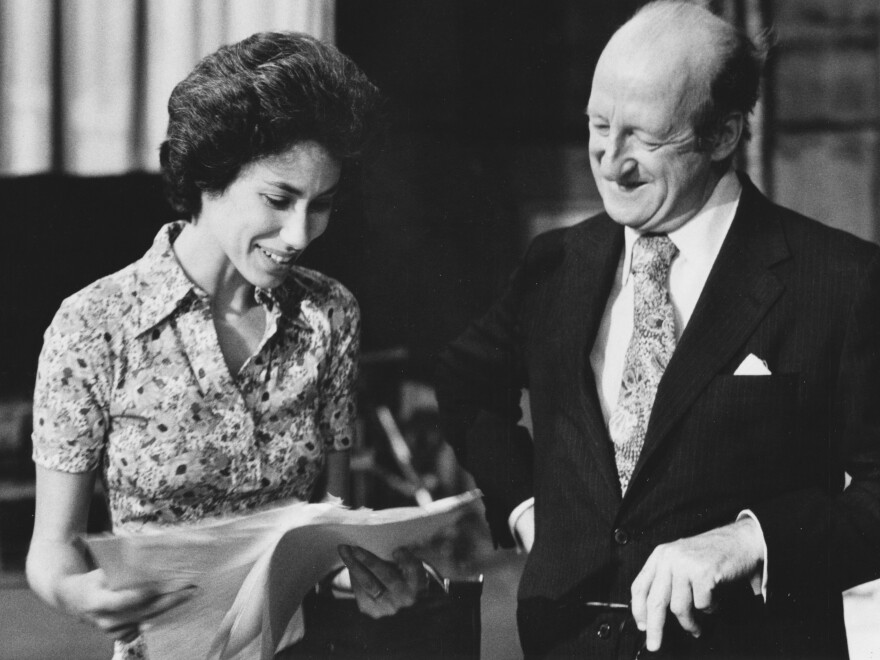Tina Brown, editor of The Daily Beast and Newsweek, tells us what she's been reading in a feature that Morning Edition likes to call "Word of Mouth."
This month, Brown shares reading recommendations related to the changing role of women, including a book about when the women of Newsweek sued their bosses, an article about a wife becoming the primary breadwinner and another about how a woman's Facebook photo reflects her sense of identity.
'Women In Revolt'
Brown's first pick is Lynn Povich's The Good Girls Revolt. In it, Povich recounts the 1970 class-action lawsuit she and her fellow female Newsweek employees filed against the magazine because, at the time, it allowed women to work only as researchers and fact checkers, not writers or editors.
What was incredible about the suit is that by the time it was filed, women had already been distinguishing themselves in journalism for decades. The policy also seemed to contradict Newsweek's editorial mission at the time.
"Here was Newsweek, which was on the vanguard of writing about civil rights, about liberal causes," Brown says, "and in fact their own culture was so kind of adamantly Mad Men."
It was the first time women in the media had sued for equal opportunity, and they made it count.
"The women got together, basically, and plotted quietly in the ladies' room what they were going to do," Brown says. "And they timed it absolutely brilliantly to coincide with the publication of a big Newsweek cover about, you know, women's lib called 'Women in Revolt.' "
Also crucial was their choice of legal representation — civil rights activist, and current D.C. congresswoman, Eleanor Holmes Norton. Brown says, "It was really [Norton's] insistence that they should not make this a kind of interoffice kind of revolt, but a real suit that actually changed the culture."
Today, Brown says, that suit remains a part of the magazine's DNA — and some argue there's still work to be done.
Rising In The Workplace
Brown's next pick is The New York Times Magazine's "Who Wears the Pants in This Economy?" an adapted excerpt from Hanna Rosin's new book, The End of Men. In it, Rosin tells the story of an Alabama husband who was the sole breadwinner in his household until he lost his job managing a textile plant.
"What we see is how the wife really thrives, finally, in this new culture because she's required to finally, you know, to get a job. ... She gets a job as a family self-sufficiency coordinator at the city housing authority," Brown says. "The husband, meanwhile, goes from job to job, trying to get hired. Each time it doesn't go well."
Meanwhile, his wife rises fast in her new job, and Rosin's article explains why.
"What we see more and more is that men are so much less adaptable," Brown says. "They're ... freighted with their own expectations. These middle-aged men who were laid off are still always really haunted by the men they used to be, the roles they used to play, their sense of their own stature. Whereas the women, of course, didn't have that stature, didn't have those roles, so they're kind of willing, really, to do anything. They're quite happy to come in at sort of more entry-level. They get a bunch of skills; they do this and that; they take on these things; and finally they become very invaluable to their companies and they rise and they rise and they're promoted while their husbands are sending out their resumes every night. It's a tragic situation, actually, of course, for the men."
The Facebook Mom
Brown's last recommendation is Katie Roiphe's Financial Times article "Disappearing Mothers," about a growing trend among moms on Facebook in which they use photos of their children as profile pictures instead of photos of themselves.
"The choice may seem trivial," Roiphe writes, "but the whole idea behind Facebook is to create a social persona, an image of who you are projected into hundreds of bedrooms and cafes and offices across the country. Why would that image be of someone else, however closely bound they are to your life, genetically and otherwise?"
"She really talks about how women still sort of want to efface themselves and promote their children as opposed to themselves," Brown says. "And she thinks that's a very unhealthy commentary on women's sense of identity."
Roiphe writes that while children are an important achievement, they shouldn't define you.
"She thinks that children should actually not be the complete center of everybody's worlds," Brown says. "They should be allowed to have their own space and identity, and so should parents."
Copyright 2022 NPR. To see more, visit https://www.npr.org.


